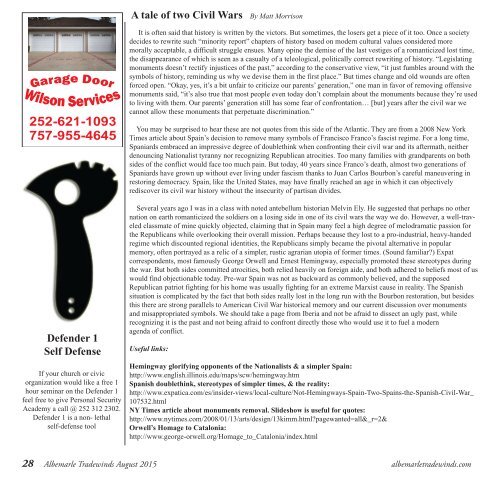Albemarle Tradewinds August 2015 Web Final
August 2015
August 2015
Create successful ePaper yourself
Turn your PDF publications into a flip-book with our unique Google optimized e-Paper software.
A tale of two Civil Wars By Matt Morrison<br />
<br />
<br />
<br />
Defender 1<br />
Self Defense<br />
If your church or civic<br />
organization would like a free 1<br />
hour seminar on the Defender 1<br />
feel free to give Personal Security<br />
Academy a call @ 252 312 2302.<br />
Defender 1 is a non- lethal<br />
self-defense tool<br />
It is often said that history is written by the victors. But sometimes, the losers get a piece of it too. Once a society<br />
decides to rewrite such “minority report” chapters of history based on modern cultural values considered more<br />
morally acceptable, a difficult struggle ensues. Many opine the demise of the last vestiges of a romanticized lost time,<br />
the disappearance of which is seen as a casualty of a teleological, politically correct rewriting of history. “Legislating<br />
monuments doesn’t rectify injustices of the past,” according to the conservative view, “it just fumbles around with the<br />
symbols of history, reminding us why we devise them in the first place.” But times change and old wounds are often<br />
forced open. “Okay, yes, it’s a bit unfair to criticize our parents’ generation,” one man in favor of removing offensive<br />
monuments said, “it’s also true that most people even today don’t complain about the monuments because they’re used<br />
to living with them. Our parents’ generation still has some fear of confrontation… [but] years after the civil war we<br />
cannot allow these monuments that perpetuate discrimination.”<br />
You may be surprised to hear these are not quotes from this side of the Atlantic. They are from a 2008 New York<br />
Times article about Spain’s decision to remove many symbols of Francisco Franco’s fascist regime. For a long time,<br />
Spaniards embraced an impressive degree of doublethink when confronting their civil war and its aftermath, neither<br />
denouncing Nationalist tyranny nor recognizing Republican atrocities. Too many families with grandparents on both<br />
sides of the conflict would face too much pain. But today, 40 years since Franco’s death, almost two generations of<br />
Spaniards have grown up without ever living under fascism thanks to Juan Carlos Bourbon’s careful maneuvering in<br />
restoring democracy. Spain, like the United States, may have finally reached an age in which it can objectively<br />
rediscover its civil war history without the insecurity of partisan divides.<br />
Several years ago I was in a class with noted antebellum historian Melvin Ely. He suggested that perhaps no other<br />
nation on earth romanticized the soldiers on a losing side in one of its civil wars the way we do. However, a well-traveled<br />
classmate of mine quickly objected, claiming that in Spain many feel a high degree of melodramatic passion for<br />
the Republicans while overlooking their overall mission. Perhaps because they lost to a pro-industrial, heavy-handed<br />
regime which discounted regional identities, the Republicans simply became the pivotal alternative in popular<br />
memory, often portrayed as a relic of a simpler, rustic agrarian utopia of former times. (Sound familiar?) Expat<br />
correspondents, most famously George Orwell and Ernest Hemingway, especially promoted these stereotypes during<br />
the war. But both sides committed atrocities, both relied heavily on foreign aide, and both adhered to beliefs most of us<br />
would find objectionable today. Pre-war Spain was not as backward as commonly believed, and the supposed<br />
Republican patriot fighting for his home was usually fighting for an extreme Marxist cause in reality. The Spanish<br />
situation is complicated by the fact that both sides really lost in the long run with the Bourbon restoration, but besides<br />
this there are strong parallels to American Civil War historical memory and our current discussion over monuments<br />
and misappropriated symbols. We should take a page from Iberia and not be afraid to dissect an ugly past, while<br />
recognizing it is the past and not being afraid to confront directly those who would use it to fuel a modern<br />
agenda of conflict.<br />
Useful links:<br />
Hemingway glorifying opponents of the Nationalists & a simpler Spain:<br />
http://www.english.illinois.edu/maps/scw/hemingway.htm<br />
Spanish doublethink, stereotypes of simpler times, & the reality:<br />
http://www.expatica.com/es/insider-views/local-culture/Not-Hemingways-Spain-Two-Spains-the-Spanish-Civil-War_<br />
107532.html<br />
NY Times article about monuments removal. Slideshow is useful for quotes:<br />
http://www.nytimes.com/2008/01/13/arts/design/13kimm.html?pagewanted=all&_r=2&<br />
Orwell’s Homage to Catalonia:<br />
http://www.george-orwell.org/Homage_to_Catalonia/index.html<br />
28 <strong>Albemarle</strong> <strong>Tradewinds</strong> <strong>August</strong> <strong>2015</strong> albemarletradewinds.com

















